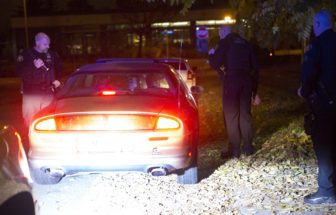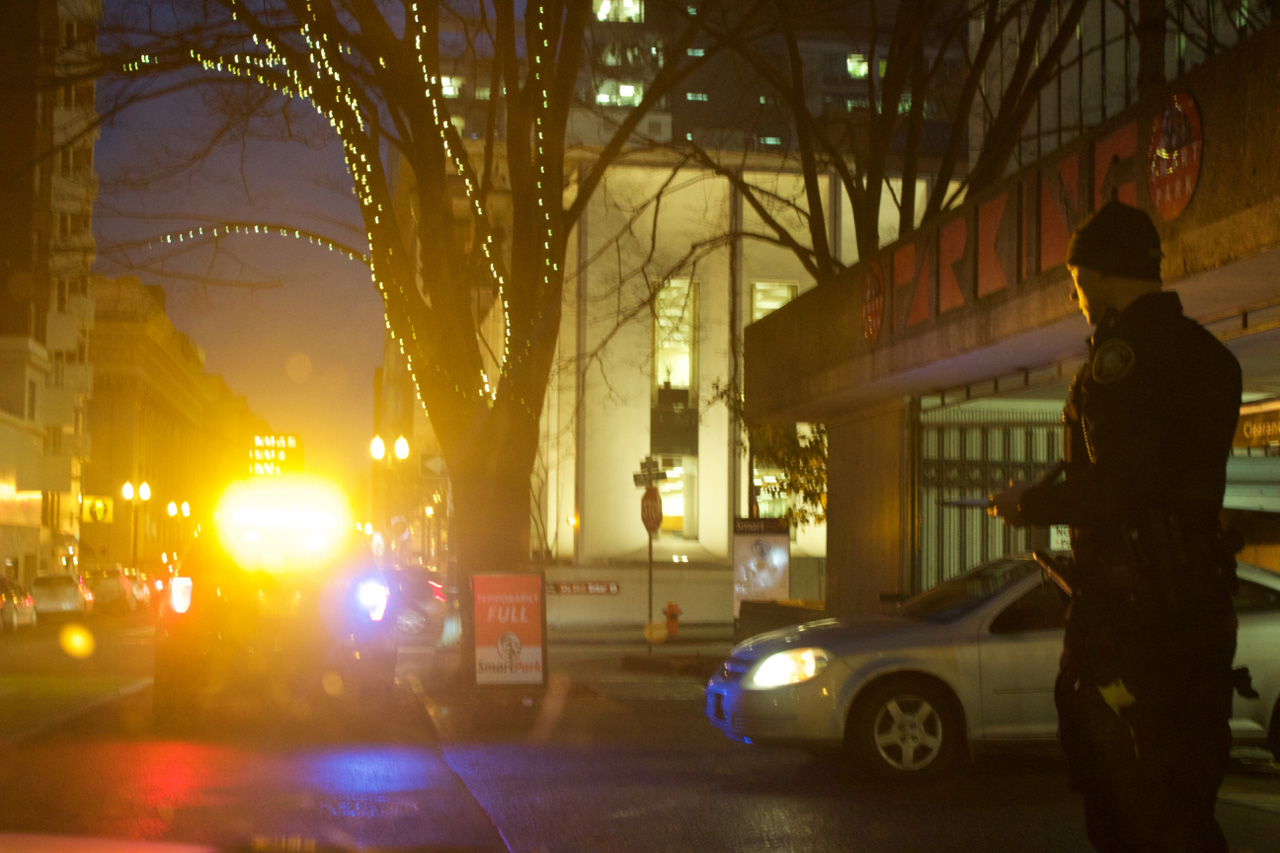Thwarted twice before, supporters will again try to require Oregon police officers to track who they detain.
As snow swirled outside his cruiser, Portland Police officer Kevin Allen typed a driver’s license number into the computer on his dash.
Inside the idling rig in front of him, a driver hung his head. He’d just blown a red light in downtown Portland, right in front of a patrol officer.
He got away with a written warning, thanks to the Jan. 10 snowstorm, and drove away. Allen, however, wasn’t done.
In addition to running the license, Allen entered other information into the computer.
Did he notice the driver’s race, age or gender before he made the stop? Did he observe any mental health issues?
“They want you to say, ‘Here’s what I knew when I went to the window” to speak to the driver, Allen said.
In this case, it was a white male, older than 25, with no apparent mental health issues.
Eighty miles south, in Corvallis, officer Trevor Anderson performs a similar routine. Any time he stops a motorist or pedestrian, he clicks on his computer screen and records the perceived race, gender and ethnicity of the person, the duration of the interaction, and whether he conducted a search. The process, which takes about 30 seconds, “becomes second nature,” he said.
It may be second nature to Anderson, but it’s rare in Oregon. The Portland and Corvallis police bureaus are among just a handful of local law enforcement agencies in Portland that track who they detain.
State courts maintain detailed records on every criminal charge filed since 1910, the penalties prosecutors seek and the outcome of every trial or settlement. The state corrections department, in turn, can tell you exactly how many people are incarcerated (14,617 as of Jan. 1), when they entered the system and when they are expected to get out, along with a breakdown by age, gender and race.
But when it comes to the most common interaction between individuals and law enforcement officers, we know very little. That’s because fewer than 1-in-20 law enforcement agencies in Oregon collect and report detailed data on the people they stop.
This month, legislators will begin discussions on House Bill 2355, which, among other things, would force police to collect “stop data.” If the bill passes, Oregon will join 19 other states, including California, which use the tool to identify possible racial profiling by police.
The lack of stop data is a huge impediment to teasing out the racial and ethnic disparities evident at almost every step of Oregon’s criminal justice system, from arrest to incarceration.
Enormous discretion
An analysis of state court records filed between January 2005 and June 2016 shows that for many crimes, black and Latino Oregonians are charged at higher rates than white residents. In Multnomah County, black residents are charged at higher rates than whites for nearly every offense. And across the state, Latino drivers are charged with some driving offenses at rates two to 11 times the rate of white drivers.
The disparities show up at the earliest point in which data are reported statewide: who’s being charged with what crimes. Are people of color more likely to be charged because they commit certain crimes at higher rates than white Oregonians? Or are police targeting them for enforcement?
“How do you know unless you have the data?” said Oregon Supreme Court Chief Justice Thomas Balmer.
If police were required to track whom they stop — and note the race and ethnicity of those individuals — it would help determine whether people of color are being singled out.
Balmer says nearly everyone in the criminal justice system — including prosecutors and judges — makes judgment calls on a daily basis. But, he argues, none has as much latitude as the men and women who are the first point of contact.
“Police officers have enormous discretion,” Balmer said. “I understand the theory: Everyone who violates that law should be held accountable. But that can’t happen. Here are a bunch of people speeding. Who am I going to stop? A group of people hanging out. Who are you going to select?”
Lawmakers in 1995 and 2001 failed to pass legislation that would require agencies to collect data on the race of people they stop or charge. And that’s fine with most local law enforcement officers.
“The data can be construed in so many different ways,” said retired Albany Police Chief Ed Boyd, now executive director of the state’s police association, the Oregon Accreditation Alliance. Well-meaning agencies, he said, fear their numbers “will be thrown back in their face.”
That response doesn’t surprise retired Hillsboro Police Chief Ron Louie.
“I’ve talked to many chiefs and sheriffs. Most of them said, ‘Crap, I don’t want them looking at my numbers and finding racism under every rock,’ ” said Louie, who was chief of the Hillsboro Police Department when it became the first Oregon agency to voluntarily gather stop data. “Or some that knew, knew the numbers would be horribly skewed. They were frightened by the scrutiny of the numbers.”

Portland Police officer Kevin Allen logs data about the race of the person he stopped and 13 other details. Photo by Lee van der Voo.
Stop data
What people call a police “stop” is any formal detention — no matter how brief — by the officer, regardless of whether it results in an arrest. It might be a quick request for identification from someone who looks out of place, a warning for running a yellow light, or a citation for failing to use a bike light.
Some states, such as Alabama, Louisiana and South Carolina, limit the stop data an officer reports to the perceived race, ethnicity and gender of the person detained.
California, Maryland, North Carolina and Connecticut require officers to collect details including the time and location of the stop, the reason for the stop, and whether the person was searched.
The provisions in Oregon House Bill 2355 are modeled after Connecticut’s Alvin Penn Act, which found significant racial disparities in three city police departments and two state patrol units in 2014, the first year for which statewide data was available.
Findings in Connecticut
Ken Barone, who manages Connecticut’s program, says collecting 26 data points takes less than a minute. Researchers, he says, analyze stop data on six indicators. Agencies that show disparities in three to six of those indicators get a closer look.
In the New Haven suburb of Waterbury, for example, stop data showed minority motorists were being pulled over more frequently during daylight hours than at night (when a driver’s race or ethnicity is harder to discern). And they were being searched more frequently than white motorists, even though they were not any more likely to have contraband.
“If you want to try to understand the patterns that are occurring and basic interactions between the community and law enforcement, it’s a good window into understanding if disparities exist and then being able to drill down to understand why those disparities exist,” Barone, a policy and research specialist at the Institute for Municipal and Regional Policy at Central Connecticut State University, told an Oregon legislative committee in December.
Since the law took effect, the number of annual racial profiling complaints in the state has dwindled from 25 to six in 2015, he said.
Oregon, which has a comparable population, had about 28 racial profiling complaints in the past year.
Oregon’s proposed bill, put forward by Attorney General Ellen Rosenblum, would require police, troopers and deputies to track the race, ethnicity and gender of drivers they stop and pedestrians they search, but not those they contact informally for “mere conversations.” If the bill becomes law, officers would collect demographic data, the location and time of the stop, the reason and outcome, and whether the vehicle was searched.
Past attempts
Years before Portland, Corvallis and Hillsboro began collecting data on stops, a state Supreme Court task force detailed disparities in arrests of people of color. It drafted legislation requiring prosecutors, not police, to document the perceived race of offenders who passed through their system. The bill died in the 1995 session.
“There were two problems with mandatory data collection in the ’90s. One was that most law enforcement jurisdictions felt, and continue to feel, this is an issue only in the city of Portland. It doesn’t apply to them,” said David Fidanque, longtime executive director of the Oregon chapter of the American Civil Liberties Union, now retired.
“The other issue has been the practical issue: what data to collect and whether it should be a permanent fixture, or something done periodically,” he said. “Even among those progressive voices in law enforcement. It was an uphill battle to convince their colleagues that this was worth doing.”
State lawmakers again considered data-collection legislation in 2001.
“I had complaints from the African-American community that they were being stopped by police unfairly,” said Vicki Walker, then a Democratic state representative from Eugene. She gathered research from across the country, compiling stacks of news clippings, studies, testimony and legislation and used the material to draft a bill of her own.
Missouri had just passed one of the strongest stop-data laws in the nation, allowing the state to withhold funding from agencies that failed to comply with the new requirement.
“That scared the hell out of people in Oregon,” Walker said. “So I couldn’t go there.”
Her bill would have required all Oregon police officers to collect up to 15 data points — including race, gender and whether the driver was searched — on an estimated 764,753 stops per year. The cost, when oversight and training were calculated, was a bit more than $2 million per year.
Walker realized she couldn’t get the bill passed in a GOP-controlled Legislature without law enforcement support. So she agreed to make the stop-data collection voluntary.
Voluntary approach not working
In the beginning, 12 agencies committed to hand over stop data, but just a handful followed through: Hillsboro, Corvallis, Portland, and the Oregon State Police. Beaverton and Eugene made early efforts, but haven’t submitted data in more than a decade.
“It’s ridiculous,” said Walker, who left the Legislature in 2009. “There’s no reason they can’t be putting in that data when they make the stop. And it’s not a big time-suck. You know, first they’ll say it’s a time-suck, then it’s a money-suck. Then it’s ‘Oh my God, you could use the data to incriminate our officers.’ ”
Walker had hoped her law allowing voluntary data collection would spark interest in the practice. Instead, it’s faded.
The task of analyzing the data fell to the Law Enforcement Contacts Policy and Data Review Committee (known as LECC). There wasn’t much data to review. Direct appeals and mass emails generated no additional volunteers, the committee wrote in its 2010 annual report.

Portland police stop a motorist in the central city. Photo by Jamie Valdez, courtesy of the Portland Tribune.
The volunteer staff struggled with a lack of uniformity in data collection and a paucity of funds. State budget cuts and an employee hiring freeze forced the program into suspension a year after it began. Two years later, the LECC partnered with Portland State University’s Criminal Justice Policy Research Institute. LECC Director Brian Renauer has volunteered his time on the committee for years.
“We survived for 11 years using federal grant dollars, and those dried up probably around 2012,” he said. “And basically the LECC efforts kind of dwindled.”
Then a 2015 law gave the LECC new life with a mandate to collect profiling complaints and a budget of $125,000 a year.
Hard choices
Under Rosenblum’s bill, data analysis would move from the LECC to the state Criminal Justice Commission.
Kelly Officer, the statistician for the commission, said she’d love to work with stop data. “The concept is really exciting,” she said. “In terms of understanding contact with law enforcement, that’s the first step. We’ve never had a good data source for that.”
But to do that, the commission would need to add to its 12-person team. So would the Oregon State Police, the agency that could be tapped to collect data from agencies across the state, and the state’s Department of Public Safety Standards and Training, which would provide technical assistance and training under the proposed law.
The cost for all that has yet to be tallied. Barone, the project manager in Connecticut, said his state spent $250,000 to implement its stop-data system.
Those who’ve fought the stop-data battle for years are skeptical that any meaningful stop-data legislation requiring funding will pass in a year when the state is facing a $1.8 billion deficit.
“From a political point of view, what a terrible time to try it,” said retired Hillsboro chief Louie. “The poor governor, I’m so sympathetic. She’s got to cut. And a lot of things are just not going to be funded. She’s making some very, very hard choices.”
Brown’s office did not respond to repeated requests for an interview. But Rosenblum said she was optimistic the Legislature will deliver a mandate despite the price tag. It’ll cost some money, she concedes. But, “it certainly saves us a lot of other things, like the dignity of people.”
State Sen. Lew Frederick, a Portland Democrat, agrees and credits a task force Rosenblum assembled for building momentum.
“When I first started talking about this, people said, ‘Oh it’s just a Portland problem. It’s a black-white thing,’ ” said Frederick, who is African-American and says he gets stopped by police about once a year.
The task force held hearings around the state, taking testimony from Latinos, Native Americans and other minorities recounting their experiences with local police agencies.
“Person after person would tell a story: ‘This is how profiling takes place. And this is how it affects me,’ ” Frederick said. “The case for moving forward is now much stronger.”
Frederick said he understands why police agencies resist collecting stop data.
“Police will say it adds to the paperwork and it does. Absolutely,” he said. “But what is the payback? We need to have that information.”
Without it, he said, agencies will not be able to pinpoint disparities in police stops and provide the training to reduce the kind of police profiling that breeds resentment and mistrust.
“Look, I want policing to work,” he said. “And for that to happen, people have to have confidence that when they encounter a law enforcement officer they will be treated respectfully. That they will feel the interaction is about how they can be helped, not how they can be controlled.”
Paris Achen and Lee van der Voo contributed reporting to this story.
Kate Willson is an independent Portland journalist and John Schrag is executive editor of Pamplin Media Group in Portland, Oregon. Paris Achen is the Pamplin group’s statehouse reporter and Lee van der Voo works for InvestigateWest.



